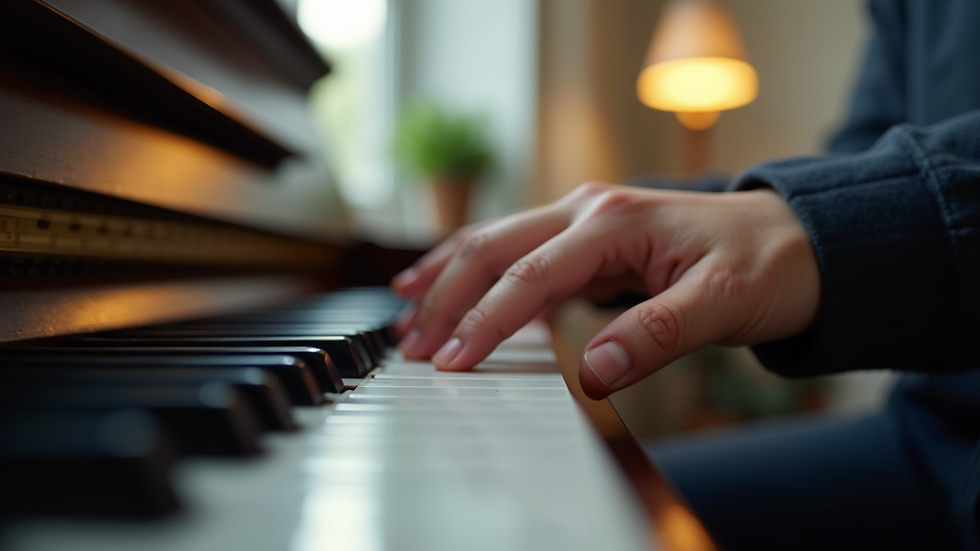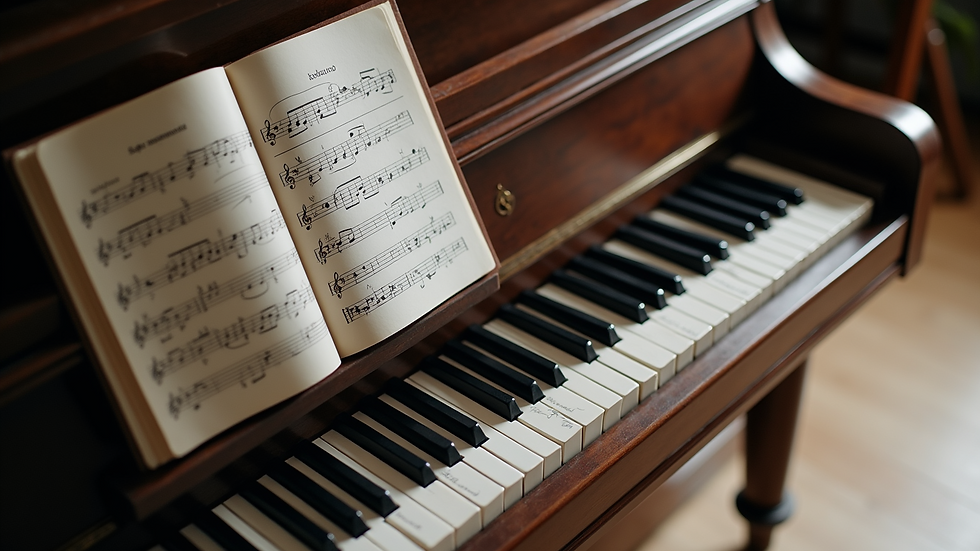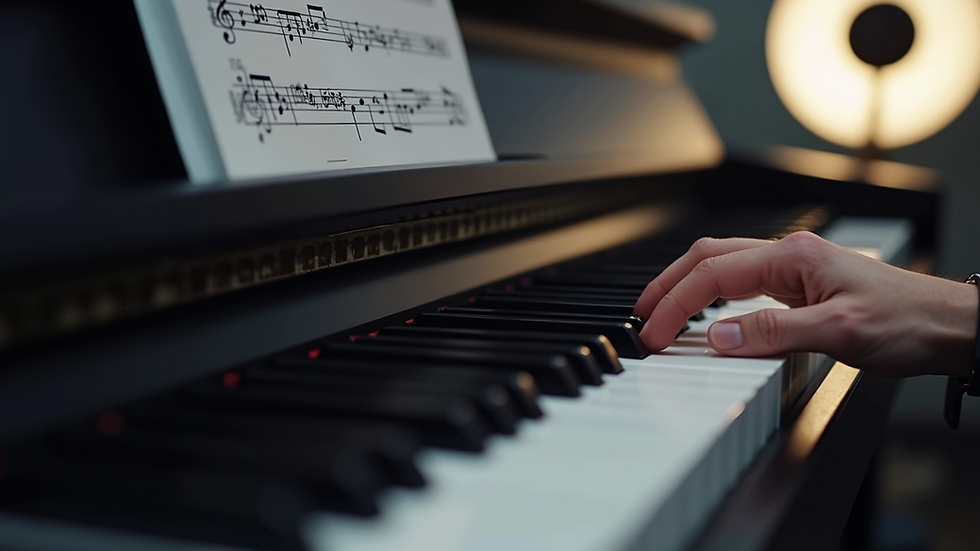Beginner Piano Lessons to Jumpstart Your Journey
- BROOKLYN MUSICALS
- Sep 8, 2025
- 4 min read
Learning to play the piano is a rewarding experience that opens the door to a world of music and creativity. Whether you dream of playing classical masterpieces or your favorite pop songs, starting piano lessons is the first step toward making that dream a reality. This guide will walk you through everything you need to know to begin your piano journey with confidence and excitement.
Why Starting Piano Lessons Is Important for Beginners
Starting piano lessons sets the foundation for your musical growth. It helps you develop essential skills such as reading music, understanding rhythm, and proper hand positioning. Without a solid start, it can be easy to develop bad habits that are hard to correct later.
When you begin lessons, you learn how to:
Identify the notes on the keyboard
Understand basic music theory
Develop finger strength and dexterity
Play simple melodies and chords
These skills build your confidence and make learning more advanced pieces easier. A structured lesson plan ensures you progress steadily and enjoy the process.

How to Choose the Right Starting Piano Lessons
Choosing the right lessons is crucial for your success. There are many options available, from private tutors to online courses. Here are some tips to help you select the best starting piano lessons:
Assess Your Learning Style
Do you prefer one-on-one instruction or self-paced learning? Some people thrive with a teacher’s guidance, while others enjoy learning independently.
Check the Curriculum
Look for lessons that cover the basics thoroughly, including note reading, rhythm, and hand techniques.
Consider Your Schedule
Choose lessons that fit your availability. Consistency is key, so pick a format you can stick with.
Look for Beginner-Friendly Resources
Good lessons for beginners often include videos, practice exercises, and feedback opportunities.
If you want a reliable and comprehensive option, consider piano lessons for beginners that offer structured guidance and support.
Can You Teach Yourself to Learn Piano?
Many people wonder if self-teaching is a viable option. The answer is yes, but it comes with challenges. Teaching yourself requires discipline, patience, and access to quality resources.
Pros of Self-Teaching:
Learn at your own pace
Save money on lessons
Explore music that interests you
Cons of Self-Teaching:
Risk of developing bad habits
Lack of personalized feedback
Difficulty staying motivated
If you choose to teach yourself, use a combination of books, online tutorials, and apps. Record your practice sessions to track progress and identify areas for improvement. Joining online forums or local music groups can also provide valuable support.

Essential Tips for Effective Practice Sessions
Practice is where your skills truly develop. Here are some tips to make your practice sessions productive and enjoyable:
Set Clear Goals
Define what you want to achieve in each session, such as mastering a scale or a simple song.
Keep Sessions Short and Frequent
Aim for 20-30 minutes daily rather than long, infrequent sessions.
Warm Up Properly
Start with finger exercises to improve flexibility and strength.
Use a Metronome
This helps you keep a steady tempo and develop a good sense of rhythm.
Break Pieces into Sections
Practice difficult parts slowly before playing them at full speed.
Record Yourself
Listening to recordings helps you catch mistakes and track improvement.
By following these tips, you’ll build a strong practice routine that keeps you motivated and progressing.
Understanding Basic Music Theory for Beginners
Music theory might sound intimidating, but it’s essential for understanding how music works. Here are some basics every beginner should know:
Notes and the Staff
Music is written on a staff with five lines. Each line and space represents a different note.
Rhythm and Timing
Notes have different lengths, such as whole notes, half notes, and quarter notes. Understanding timing helps you play music accurately.
Scales and Keys
Scales are sequences of notes that form the basis of melodies. The key tells you which notes are used in a piece.
Chords
Chords are groups of notes played together. Learning common chords helps you accompany melodies.
Many beginner lessons include simple theory explanations alongside practical exercises. This combination helps you apply theory directly to your playing.

Next Steps to Keep Your Piano Journey Moving Forward
Once you have mastered the basics, it’s time to expand your skills. Here are some ways to continue your progress:
Explore Different Genres
Try classical, jazz, pop, or blues to find what you enjoy most.
Learn to Play by Ear
Practice listening to songs and figuring out the notes without sheet music.
Join a Group or Ensemble
Playing with others improves timing and makes learning fun.
Set Performance Goals
Prepare a piece to play for friends or family to build confidence.
Consider Advanced Lessons
As you improve, look for lessons that focus on technique, improvisation, and music theory.
Remember, the key to success is consistent practice and a love for music. Starting piano lessons is just the beginning of a lifelong journey filled with creativity and joy.
Starting your piano journey is an exciting adventure. With the right lessons, practice habits, and mindset, you can unlock your musical potential and enjoy the beauty of playing the piano. Whether you choose guided lessons or self-teaching, the important thing is to start and keep moving forward. Happy playing!


Beginner piano lessons really show how consistency and guided practice build confidence over time. I noticed similar discipline helped during communication-heavy coursework. When balancing practice schedules, I once relied on Take My Online Exam Pro alongside online English communication exam takers, as a supportive option, not a shortcut.
The step-by-step approach for beginner piano lessons here is fantastic, breaking complex skills into small, achievable goals really mirrors how learning thrives. In my own work, I’ve noticed that Academic Editors offer a similar clarity when reviewing papers, and their affordable research proposal editing helps streamline ideas without losing nuance.
informative blog